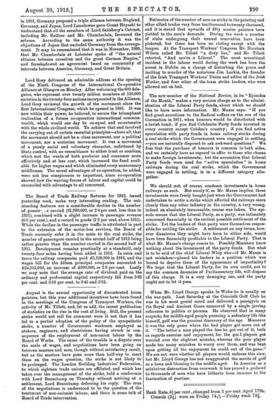August is the annual opportunity of discontented house painters, but
this year additional incentives have been found in the meetings of the Congress of Transport Workers, the activity of Mr. Tillett, and, let us add, the recent publication of statistics on the rise in the cost of living. Still, the present strike would not call for comment were it not that it has led to a partial adoption of the policy of the sympathetic strike, a number of Government workmen employed as stokers, engineers, and electricians having struck in con- sequence of the employment of non-union labour by the Board of Works. The cause of the trouble is a dispute over the scale of wages, and negotiations have been going on between masters and men, though without satisfactory result, but as the masters have gone more than half-way to meet them on the wages question, the strike is not likely to be prolonged. The London Building Industries' Federation, to which eighteen trade unions are affiliated, and which has taken over the management of the strike, held a conference with Lord Beauchamp on Thursday without arriving at a settlement, Lord Beauchamp deferring his reply. The crux of the negotiations is understood to be the question of the treatment of non-unionist labour, and there is some talk of Board of Trade intervention.
Estimates of the number of men on strike in the painting and other allied trades vary from ten thousand to twenty thousand, and it is stated that upwards of fifty master painters have yielded to the men's demands. During the week a number of clubs undergoing their annual renovation have been picketed, but there has been no rioting except with the tongue. At the Transport Workers' Congress Mr. Havelock Wilson called Mr. Tillett "a dirty liar," and Mr. Tillett retorted, "And you're a Liberal." The most sensational incident in the labour world during the week has been the arrest in Dublin on a charge of disturbing the peace and inciting to murder of the notorious Jim Larkin, the founder of the Irish Transport Workers' Union and editor of the Irish Worker, and four other of the tram strike leaders, who were allowed out on bail.


































 Previous page
Previous page